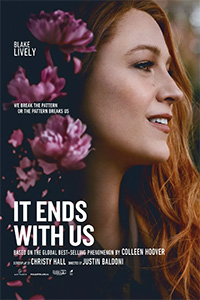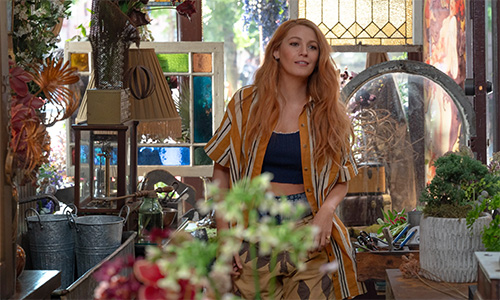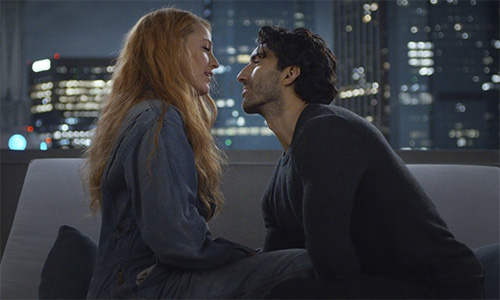 It Ends With Us, the 2024 film from director Justin Baldoni (Clouds, Five Feet Apart), is another example of a film movie that had the potential to be great but ultimately tried to either do too much or incorporate too many elements that weren’t otherwise needed in an attempt to want to be more than the movie was capable of delivering. While there is quite a discrepancy between critics and audiences (55% vs. 89% fresh on Rotten Tomatoes), it’s tough to dispute that this touches on issues significant in today’s society, including a conclusion that feels murky and haunting, but also honest and authentic, and one that I haven’t seen before in movies or shows about the subject matter. It Ends With Us does have trigger warnings. Proceed cautiously as you decide to watch or read my review.
It Ends With Us, the 2024 film from director Justin Baldoni (Clouds, Five Feet Apart), is another example of a film movie that had the potential to be great but ultimately tried to either do too much or incorporate too many elements that weren’t otherwise needed in an attempt to want to be more than the movie was capable of delivering. While there is quite a discrepancy between critics and audiences (55% vs. 89% fresh on Rotten Tomatoes), it’s tough to dispute that this touches on issues significant in today’s society, including a conclusion that feels murky and haunting, but also honest and authentic, and one that I haven’t seen before in movies or shows about the subject matter. It Ends With Us does have trigger warnings. Proceed cautiously as you decide to watch or read my review.
This movie riveted me. I was likely one of the few who knew nothing about the plot. I had heard the movie title repeatedly referenced in the news and was aware that the film’s star, Blake Lively (A Simple Favor, The Shallows), had been living in TMZ and other entertainment gossip-related headlines for months. I knew it was over something pertaining to the movie. I did not realize that the controversy and accusations were with Baldoni about some of the things that happened on the set of this movie, as well as the publicity tours before its theatrical release, or how far this had spilled into courts, online tabloids, and respectable news sources. I’ve only done a cursory look at the allegations levied by each party since. While the issues at the center of their back and forth are not to be taken lightly, especially in today’s culture and society, they hadn’t affected me until my viewing. That’s all to say that I had unintentionally separated art from reality until then and didn’t want it to impede my experience with a good movie.
It Ends With Us revolves around the cycle of domestic violence and what it takes to break this pattern of abuse. It acknowledges the severity of the topic. We meet Lily Bloom (Lively) in the film’s opening scenes. Her father has just died. She attends the funeral with her mother, Jenny (Amy Morton – NBC’s Chicago PD, Up in the Air), a victim of her father’s physical abuse. Lily is asked to give the eulogy as her father’s only child. When she begins to speak, she unfolds a piece of paper about the five best things about her dad. It was blank. We see firsthand that no love is lost between the two as she steps down from the podium and leaves the church.
Baldoni also stars in this movie, portraying Ryle, a successful surgeon with a mysterious side. From the moment Ryle and Lily meet on the rooftop of Ryle’s condominium building, we glimpse what we’ve been conditioned to believe may come. Ryle is charming, handsome, and persistent. While Ryle’s charm intrigues Lily far more than she’s letting him think, she does not fall for his rehearsed lines, going so far as to ask him how often his smooth persuasion works with picking up women, to which, without missing a beat, says all the time. Their encounter doesn’t escalate behind a conversation. The two parted ways without even an exchange of phone numbers.

Of course, Lily and Ryle will reencounter each other, even in a city as big as Boston. Lily’s dream of a flower shop is about to be realized, but not before a bubbly, persistent, and likable woman named Alyssa (Jenny Slate – On the Rocks, Everything Everywhere All At Once) insists on becoming Lily’s employee. Soon, she insists she is Lily’s best friend. Alyssa’s character lightens the mode in an otherwise overly intense film. When Ryle approaches the flower shop one day, we all learn that he and Alyssa are siblings. We receive Ryle’s undeniable charisma differently after the sullen turn in Alyssa’s demeanor. We notice it as an audience, even though Lily does not.
I do not want to say much more about the story other than domestic abuse is known for being cyclical. Often, the victims miss it, dismiss it, or blame themselves. Otherwise, intelligent and aware humans show a side of them that a casual observer or even a friend would miss. In some fashion and form, that is what happens with our story. It Ends With Us becomes a troubling watch, at times, primarily because of how identifiable it is, whether we are victims ourselves, know someone in an abusive relationship, or what we see in the media or other fictionalized or non-fictionalized art, such as film, television, music, and books. Our lead characters are so vividly distinct that we feel like we know them while, at the same time, coming to the adage, “How well do any of us truly know anyone?” The film gives us expected and unexpected answers that feel heartbreaking but also genuine.
In her feature-length debut, Isabela Ferrer portrays the late high school version of Lily. She offers much more than a glimpse of Lily’s awareness and compassion for others. This includes befriending Atlas (Alex Neustaedter – Low Tide, American Woman), a homeless boy her age, who she witnesses digging through the garbage for food. While others refuse to give him the time of day while making fun of how repugnant he smells from not showering regularly, Lily leaves food outside the rundown building where he squats. The pair develop a mutual attraction for each other and begin a secretive relationship that comes to a screeching end in one of the film’s more memorable scenes. There is a goodness in Atlas. Based on the film’s subject matter, we hope he is the man he has been portrayed as. But, of course, we are weary.

Baldoni’s vision builds intrigue. As an audience, we know much more than meets the eye. But he keeps us guessing in a way that makes us nervously anticipate what will happen next while also wanting the current scene to end. I enjoy it when a movie incorporates flashbacks when done correctly. That is what Baldoni does with Lily and Atlas’s relationship. Baldoni answers how the flashbacks impact the present while not directly answering why Lily and Atlas completely disconnected in a day and age (mid-2000s) when it would have been much easier to find someone online than it would have been even five years earlier. However, our lasting memory of the young Lily/Atlas flashback was not enough for us to conclude that this would be the last time we see Atlas.
What Baldoni’s movie does best, though, is not conclude in the way that we may have anticipated. This is not to say there is a twist because there certainly isn’t. But instead of the expected good defeating evil, we have a much more complex, realistic situation between two people who will forever remain in each other’s lives through circumstance. Lily and Ryle don’t need all the answers immediately but must find common ground to make their situation work. While I wanted to shout at one character, “What are you doing?” I understood that this would have been the easy way out. Or this might have been what we expected from an 80s, 90s, or 2000s movie. It might have even been the case if it was a 2010s release. But the 2020s are both complicated and changing. The film’s conclusion was not one that I anticipated or expected. We have been conditioned for a movie of this magnitude to end a certain way. Baldoni changes that norm, causing one or more characters to act in a way that makes us say, “Why?” before we answer that answer for ourselves with a “Because.”
Plot 8/10
Character Development 8.75/10
Character Chemistry 8.5/10
Acting 8.5/10
Screenplay 8/10
Directing 8.25/10
Cinematography 9/10
Sound 8.5/10
Hook and Reel 9.5/10
Universal Relevance 10/10
87%
B+
Movies You Might Like If You Liked This Movie
- Alice, Darling
- Blue Valentine
- Sleeping With the Enemy
- Luckiest Girl Alive
- Eternal Sunshine of the Spotless Mind